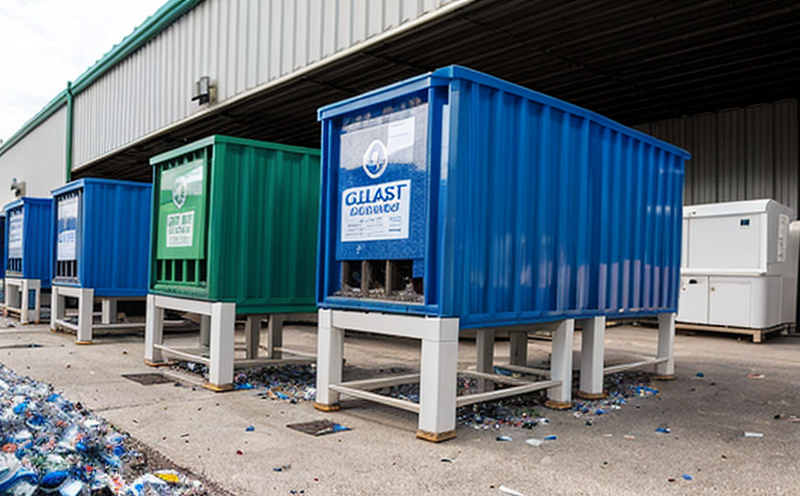ISO 12824 Recycled Glass Density Determination
The ISO 12824 standard provides a method for determining the apparent density of recycled glass. This test is particularly important in sectors such as waste management and recycling, where accurate measurement of recycled materials helps ensure quality control, compliance with regulations, and efficient resource recovery.
Recycled glass is used extensively in various applications like road aggregates, aggregate backfilling, construction products, and even as a raw material for new glass production. To optimize these processes, it's crucial to measure the density of recycled glass accurately. The standard outlines a procedure using immersion in water and measuring the volume displaced, providing a reliable method that is widely accepted globally.
The process involves precise specimen preparation and calibration of instruments. Specimens must be homogeneous and representative of the batch being tested. Calibration ensures accurate readings from the densimeter used for this purpose. The standard also specifies acceptance criteria which include precision and bias requirements to ensure consistent results across different laboratories.
| Step | Action |
|---|---|
| 1 | Select a representative sample of recycled glass from the batch. |
| 2 | Weigh the sample accurately. |
| 3 | Submerge the sample in water and measure the volume displaced using a densimeter. |
| 4 | Calculate the apparent density based on mass and volume obtained. |
The precision and bias requirements specified by ISO 12824 ensure that results are consistent and comparable between different testing facilities. This is critical for industries relying heavily on recycled materials, ensuring they meet quality standards set by regulatory bodies like the European Union’s Waste Framework Directive.
Accurate density measurements enable better decision-making regarding the use of recycled glass in various applications. For instance, road construction projects require specific particle size and density ranges to ensure longevity and performance. By adhering to ISO 12824, quality managers can confidently select materials that meet these criteria.
This testing method is also crucial for R&D engineers looking to explore new uses for recycled glass or improve existing processes. With consistent data from standardized tests like ISO 12824, they can develop formulations and applications knowing the behavior of the material in different environments is predictable and reliable.
Why It Matters
The accurate determination of recycled glass density via ISO 12824 ensures consistent quality across batches, which translates to better performance and durability in end products. In waste management and recycling sectors, this precision is essential for meeting environmental standards and reducing landfill waste.
By ensuring that recycled glass meets specified density requirements, industries can enhance their sustainability efforts. This not only helps in minimizing the carbon footprint but also supports circular economy principles by maximizing resource recovery and reutilization.
The standard's importance extends beyond just quality assurance; it plays a pivotal role in regulatory compliance. Many regions have stringent regulations regarding the use of recycled materials, and adherence to ISO 12824 can help organizations avoid penalties and maintain their reputations as responsible stewards of resources.
For procurement departments, this standard offers a benchmark against which they can evaluate suppliers. Ensuring that all glass used meets these standards helps in maintaining consistent quality throughout supply chains, thereby reducing variability in product performance.
International Acceptance and Recognition
- The ISO 12824 standard is widely recognized by regulatory bodies worldwide.
- It is adopted by numerous countries as part of their national standards.
- This ensures that results obtained from this test are universally accepted in international trade scenarios.
- The standard's precision and reliability have made it a go-to method for both industry professionals and academics alike.
The global acceptance of ISO 12824 underscores its importance as a tool for ensuring consistency and quality in recycled glass density testing. Its widespread adoption by countries such as the United States, Canada, Europe, and Asia further reinforces its role as an essential standard in this field.
Use Cases and Application Examples
| Application | Description |
|---|---|
| Road Construction | Ensuring recycled glass meets density requirements for road aggregates improves the durability of pavements. |
| New Glass Manufacturing | Using recycled glass in new production processes optimizes resource efficiency and reduces costs. |
| Agricultural Applications | Recycled glass used as aggregate backfilling can enhance soil stability and drainage. |
| Construction Products | Incorporating recycled glass into construction products can add strength while reducing environmental impact. |
The ISO 12824 standard is integral to these applications, providing reliable data that supports informed decision-making. For instance, in road construction projects, accurate density measurements ensure the longevity of pavements by aligning with specified particle size and density ranges. In new glass manufacturing processes, this standard helps optimize resource efficiency and reduce costs.
Additionally, recycled glass used as aggregate backfilling enhances soil stability and drainage, while its incorporation into construction products adds strength without compromising environmental sustainability.





